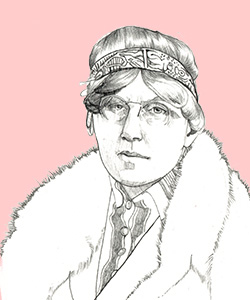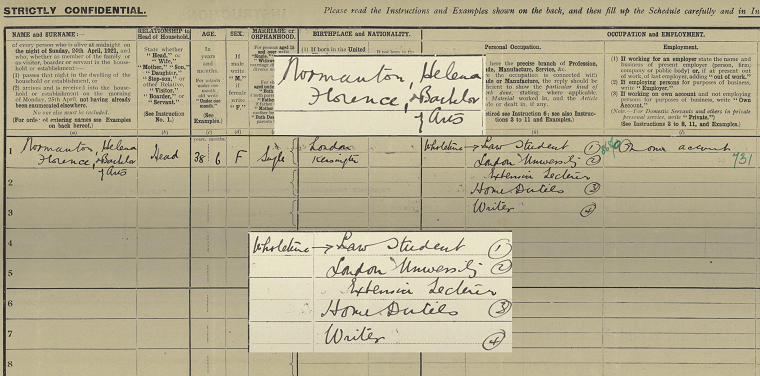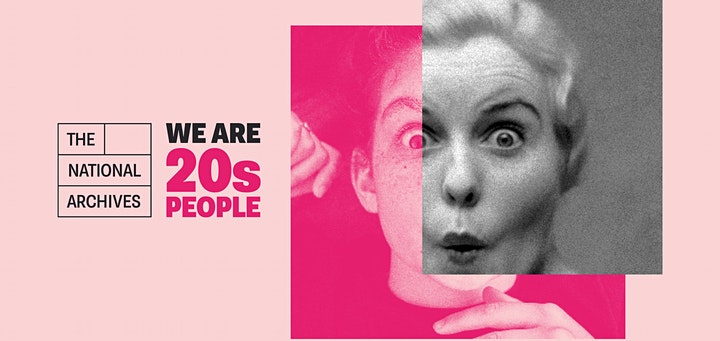 20 People of the 20s is part of 20sPeople – our season to mark the release of the 1921 Census, connecting the 1920s and the 2020s. This story was researched by Steven Franklin, Digital Engagement Officer.
20 People of the 20s is part of 20sPeople – our season to mark the release of the 1921 Census, connecting the 1920s and the 2020s. This story was researched by Steven Franklin, Digital Engagement Officer.
One of the first female barristers

An illustration of Helena Normanton, created from a photograph. By Sophie Glover.
Helena Normanton was a pioneering figure within the British legal profession during the 1920s. Born in London on 14 December 1882 to William Alexander Normanton (1853–1886) and Jane Amelia (1850–1900), she was the eldest of two daughters born. Helena’s father died under mysterious circumstances when she was four, forcing her mother to support the family alone.
Despite this setback, Helena excelled at school, winning a scholarship to York Place Science School in Brighton, and undertaking teacher training at Edge Hill, Liverpool. Upon completion, she lectured in history at Glasgow and London universities. During the period up to 1918, Helena combined teaching with a developing interest in the position of women, writing and delivering numerous public speeches on these issues.
In 1914 she published a pamphlet entitled Sex Differentiation in Salary, which argued for equal pay for equal work – a topic that she would remain committed to throughout her life. As part of the 700th anniversary of Magna Carta in 1915, Helena provided one of two talks at a charity event, arranged by the Women’s Freedom League (WFL). Her talk challenged the traditional argument that styled the charter as a mere list of provisions to suit a group of selfish and disgruntled barons. If this was the case, Helena asked, why was it ordained that Magna Carta was to be read aloud twice a year? Indeed, Helena is recorded as stating:
‘The charter is everything to us; it is the legal basis for the enfranchisement of Englishwomen.’
Following the partial enfranchisement of women in February 1918, Helena submitted her first application to Middle Temple; it was rejected almost immediately. Undeterred, she petitioned the decision in the House of Lords, supported by the WFL. The hearing never took place, however, because of the introduction of the Sex Disqualification (Removal) Bill (1919), allowing women entry to the legal professions. Her second application was successful and she became the first woman to be admitted as a student to the bar. She was called to the bar on 17 November 1922.
While completing her studies, Helena married Gavin Bowman Watson Clark. Her marriage was thrown into the public spotlight when she submitted an application to retain her maiden name. Helena disapproved of the way that marriage effectively constituted a loss of a woman’s identity and the knock-on legal disadvantages that came with it – something which Hilda Toyokawa, another of our 20 People of the 20s, experienced when she was stripped of her British nationality upon marriage to a Japanese national. She spent her life pairing the title ‘Mrs’ with her maiden name, Normanton – a compromise that enabled her to signify her status as a married woman and keep her identity.

Helena’s 1921 Census record, showing her range of employment
Helena become heavily involved with the Magna Carta Commemoration Committee in the interwar period – a local organisation based in Egham that sought to ensure annual anniversary observances at Runnymede. At first, her involvement in this provincial organisation appears strange. However, Helena first learnt of the government’s plan to sell Runnymede in 1921, while sorting through various Parliamentary papers at Middle Temple. Alarmed by the possible sale of this historic ground, she alerted sympathetic MPs, spoke with various newspaper editors, and formed a committee. Following the backlash, the Government abandoned the proposed sale, which ensured Runnymede’s short-term future. An arrangement that gifted the land to The National Trust – which Helena helped broker – secured the future of Runnymede; commemorative activity at Runnymede became more sporadic as a result, and ceased with the outbreak of war in 1939. Helena’s priorities shifted away from the interests of the Egham committee to a London-based Magna Carta Society (MCS), where she held the role of honorary secretary until she stepped down in 1953.
The 1920s to 1950s saw Helena underline her reputation as a pioneering woman barrister. She was the first female counsel to sit on cases in the High Court of Justice, Old Bailey, and the London Sessions. In 1925, she became the first woman to conduct a case in the United States, sitting on a test case that would ensure married women had the right to retain their maiden name upon marriage. In 1948 she became the first woman to lead the prosecution in a murder trial. The following year, along with Rose Heilbron, she became the first female King’s Counsel in England and Wales.
Helena Normanton died in Sydenham, London, on 14 October 1957. Throughout her life, she challenged societal norms and looked to push the boundaries of acceptability for women in their professional life. She is rightly known as a pioneer in the legal world. Despite the many firsts she had professionally, she remains a relatively unknown public figure.
Find out more
If, like Helena, you are fascinated by the Magna Carta, you can take a look at our digital copy of the original that we hold: Discovery – Magna Carta
Book on to one of our online curator tours to learn more about the census, and life in 1920s Britain: Online curator tour | The 1920s: Beyond the Roar Tickets, Multiple Dates | Eventbrite
What is 20 People of the 20s?
20 People of the 20s is a project where staff members at The National Archives have researched a story of someone from the 1920s. From family members and First World War service personnel, to famous performers and politicians, we hope these stories will encourage you to explore the breadth of experience in 1920s Britain. 20 People of the 20s is part of 20sPeople – our season to mark the release of the 1921 Census, connecting the 1920s and the 2020s. Find out more here.

